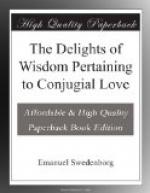love but the love of the sex? and the love of the
sex is free with every woman. The reason why civil
laws are against adulteries is, because lawgivers
have believed that to prohibit adultery was connected
with the public good; and yet lawgivers and judges
sometimes commit adultery, and say among themselves,
’Let him that is without sin cast the first
stone.’ Who does not know that the simple
and religious alone believe adulteries to be sins,
and that the intelligent think otherwise, who like
us view them by the light of nature? Are not
adulteries as prolific as marriages? Are not
illegitimate children as alert and qualified for the
discharge of offices and employments as the legitimate?
Moreover families, otherwise barren, are provided
with offspring; and is not this an advantage and not
a loss? What harm can come to a wife from admitting
several rivals? And what harm can come to a man?
To say that it brings disgrace upon a man, is a frivolous
idea grounded in mere fancy. The reason why adultery
is against the laws and statutes of the church, is
owing to the ecclesiastic order for the sake of power;
but what have theological and spiritual things to
do with a delight merely corporeal and carnal?
Are not there instances of adulterous presbyters and
monks? and are they incapable on that account of acknowledging
and worshipping God? Why therefore do those three
priests preach that adulterers have no acknowledgement
of God? We cannot endure such blasphemies; wherefore
let them be judged and punished.” Afterwards
I saw that they called judges, whom they requested
to pass sentence of punishment upon them: but
the judges said, “This is no part of our jurisdiction;
for the point in question is concerning the acknowledgement
of God, and concerning sin, and thus concerning salvation
and damnation; and sentence in these cases must come
from heaven: but we will suggest a method to you,
whereby you may know whether these three priests have
preached truths. There are three places which
we judges know, where such points are examined and
revealed in a singular manner: One place is, where
a way into heaven is open to all; but when they come
into heaven, they themselves perceive their own quality
as to the acknowledgement of God: the second is,
where also a way is open into heaven; but no one can
enter into that way unless he has heaven in himself:
and the third is where there is a way to hell; and
those who love infernal things enter that way of their
own accord, because from delight. We judges charge
all to go to those places who require judgement from
us concerning heaven and hell.” On hearing
this, those who were gathered together, said, “Let
us go to those places;” and while they were
going to the first, where a way into heaven is open
to all, it suddenly became dark; wherefore some of
them lighted torches and carried them before.
The judges who were with them said, “This happens
to all who go to the first place; as they approach,
the fire of the torches becomes more dim, and is extinguished




